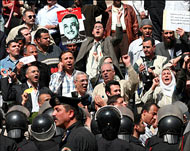Mubarak on charm offensive
Egypt’s veteran President Husni Mubarak has kept everyone guessing whether he plans to stand again in elections this year but is seeking to present a softer image of himself.

Mubarak launched his charm offensive in a marathon seven-hour television interview broadcast in Egypt this week.
“The decision on whether or not to nominate myself has not yet been taken,” said Mubarak, who will turn 77 next week and has ruled the country for the past 24 years.
Mubarak, whom local media had speculated would announce “a big surprise” on Tuesday night, said instead he did not want to rush a decision as he needed to “study it from all sides”.
The man who survived six assassination attempts since he succeeded slain president Anwar al-Sadat, reiterated his wish to retire as Egypt‘s ambassador to Britain.
Although he is widely expected to seek a fifth mandate in the next polls scheduled for September, Mubarak said he had “no political ambitions” when al-Sadat made him his deputy in 1975.
Past recalled
The Egyptian president humorously recalled the evening Sadat broke the news to him, saying that he had only one thing in mind: not be asked to stay on for dinner since he had a previous engagement with his wife Suzanne.
|
“I prefer to be slow Husni Mubarak, |
“I was petrified at the news of my appointment but I never shied away from responsibilities nor did I lose my self-confidence,” he told his interviewer on Tuesday.
Shot against different backgrounds – in Mubarak’s office, at the air force hearquarters, and in his private residence’s gardens – the interview was broadcast three nights in a row, starting last Sunday, during prime time, after the news on Egypt‘s public Channel One.
“The techniques were similar to those used in US political shows and aim to reconstruct one’s image. It’s a first in Egypt‘s political history,” Mustafa Kamal Sayid, who teaches sociology at the American University in Cairo, said.
The former pilot who became air force commander in 1972, a year before he contributed to the decision to launch Egypt‘s third war with Israel, gave a personal account of his role in Egypt‘s history but without revealing any secrets.
“He softened his public image and people had the impression they were discovering another man, a man closer to them,” Hasan Nafaa who heads Cairo University‘s institute of political and economic studies, said.
Leadership skills
But Mubarak also insisted on his great leadership skills, starting with a well-developed sense of responsibility, a taste for teamwork, a cold-blooded stance when needed, and a readiness for dialogue with opponents.
 |
|
In recent weeks, Egypt has been |
“I prefer to be slow but make the right decision than hastily proceed and expose myself to danger,” he confided.
Mubarak treated viewers to an emotional walk down memory lane, describing the humiliating defeat against Israel in 1967 when most Egyptian airplanes were destroyed on the ground and he was forced to reach his base by train.
“Never again,” he said.
He praised his fellow citizens’ staunch nationalistic feelings, saying that Egypt “was never pressured by the United States in launching political reforms” and “squarely refuses the presence of foreign military bases on its soil”.
But following growing international and domestic calls for more political freedom, Mubarak agreed earlier this year to amend the constitution and allow for the first multi-candidate elections in Egypt‘s history.
In recent weeks, Egypt has been rocked by a string of unprecedented street demonstrations where elements of the opposition have directly challenged Mubarak and urged him to step down.